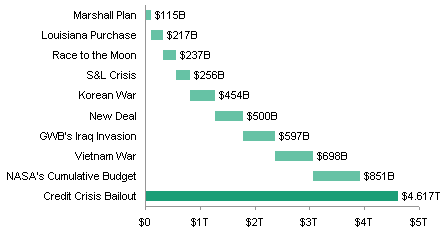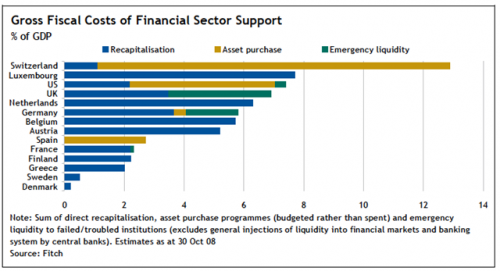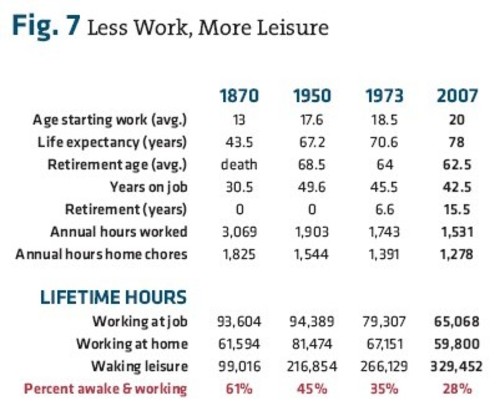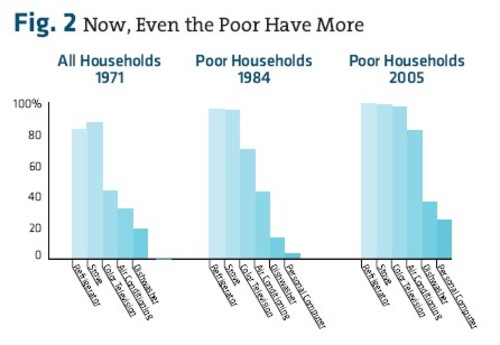Looking at the Business Cycle as an MBA Rather Than an Economist: The Effect of Organizational Dynamics on Recessions
I will confess that there is much about advanced economics that I have trouble following, because I just don't have the background. I suspect I am more comfortable with a mal-investment model of recessions because it is something I can see and understand as a business guy, whereas when talk gets into monetary policy I can quickly get lost.
For example, in this Arnold Kling review of Scott Sumner's book on the Great Depression, I totally get this:
Sumner's theoretical framework starts with a straightforward explanation for fluctuations in employment and output. Large shortfalls in output and employment occur when relatively flexible prices fall in relation to relatively sticky wages. When firms face high wages and low prices, they have to cut back on employment and output.
A business guy (outside of a commodity business) would probably say he sees a fall in demand for his product rather than a fall in prices, but I understand enough economics to know that these are essentially interchangeable -- the business is seeing a fall in demand at the old price but would likely see the same old demand if the price were lowered.
However, when I read stuff like this, I start to get lost.
If investors believe that the future path of monetary policy is expansionary, then they will immediately start to bid up prices for sensitive commodities. This means that if the central bank sends a credible signal today that it will maintain an expansionary stance going forward, this can quickly raise prices relative to wages, leading to a rapid expansion of employment and output.
I understand it intellectually, but I certainly don't go on a buying spree the moment the Fed announces more QE (though in retrospect looking a the rise in financial asset prices over the last few years, I should have).
But where I was going with all this is there are real-world effects that I am positive contribute to the depth of recessions that I seldom see in these economic theories. For example, economic theories tend to assume firms are properly staffed heading into the downturn, such that layoffs are driven by the fall in prices/demand.
But that is not ever the case. In my experience, it is an iron law of organizations that their staffing grows fat in the good times. No matter how tough or attentive the management, firms will put on too much staff.
My personal theory is that organizations have a life of their own. Almost literally. In many ways the organization acts as a living entity with a mind of its own, trying to grow and feed itself. It does not consider what size it should be, any more than a deer heard is concerned about its size vs. the available food supply. It will keep growing until it is culled by an outside force (lack of food or a predator).
I think of organizations the same way, and the only way to check its growth is with active management from the top. Managers have to constantly stay on top of the organization's size and be pruning or culling it constantly (depending on the metaphor you want to latch on to). However, because of scale economies, profits tend to grow faster than revenues at the top of the business cycle. This creates a certain comfort level among management, and since pruning the organization is emotionally difficult -- at the least saying no to people's resource requests and at the most demanding layoffs --managers don't keep up with their job in this area in the good times. No one notices that a 15% profit growth could have been 20% if they organization had properly been kept in check.
Then comes the downturn. Demand and/or prices are falling, and profits are falling faster than revenues, and the crisis is now at hand. Now that we have overcome whatever emotional starting friction there is to have layoffs, we might as well do the job right and cut not only what is required to keep up with falling prices, but we might as well take a look at the bloat we accumulated in the good times and right-size that away as well. In fact, many businesses I have worked for or with as a consultant like to overshoot what they might have previously thought of as the right-size point, and cut even deeper, hoping that the limited resources will push the organization into finding new inefficiencies in how it does things.
And thus, in my view, the degree of layoffs in a recession will tend to be larger than that one might predict solely from sticky wages and declining prices/demand.
By the way, for those of us who are skeptical about the government's ability ever mange a task efficiently, this organizational theory is one explanation. Often commenters make the mistake of assuming that when I criticize tendencies in government organizations to look after themselves (rather than their mission) that I am singling government out as somehow operating differently from the private world. That is not true. Government is made up of the same human beings as businesses (though perhaps there is some negative self-selection) and government organizations are going to have the same tendencies as private organizations.
The difference is one of correction mechanisms and incentives. Eventually, the private organization must clean out the bloat or else it will fail and go out of business entirely (unless of course the government bails it out, see: GM). There is no such accountability with government organizations. They just deficit spend or demand more taxes when they get bloated. Making this worse are the incentives of government agency leaders. Lacking a profit metric or even a customer service metric, government agency managers typically get their pay and prestige set based on the budget and headcount of the organization they run, so cost and headcount cutting run directly counter to their incentives. Combine this with higher barriers in government organizations to cleaning house (e.g. public union power and politicization of what should be efficiency decisions) and we get the dysfunctionality of government. But again note, this is an issue of accountability mechanisms and incentives, not of having better or worse or smarter people.





